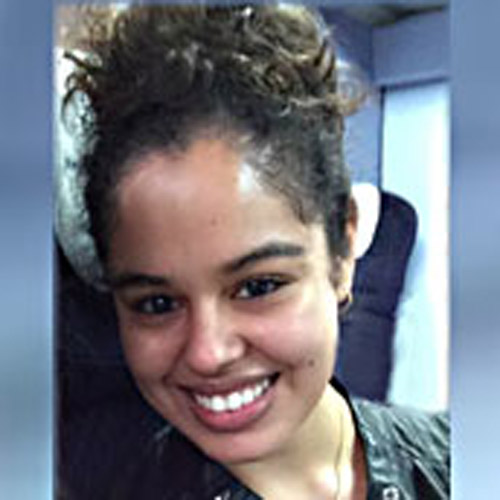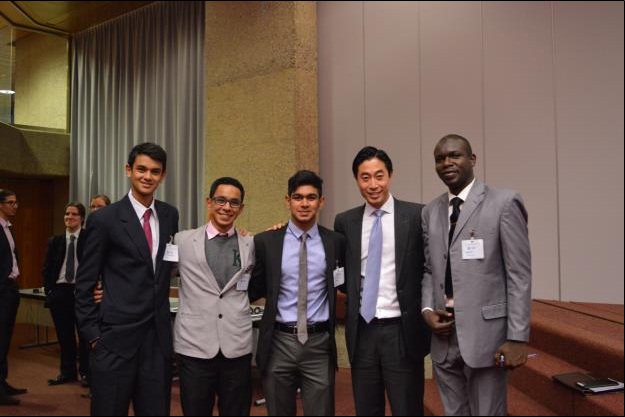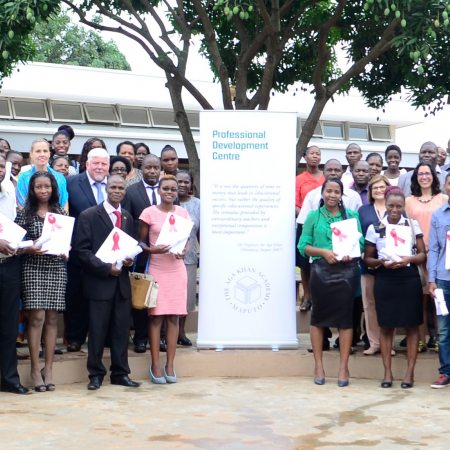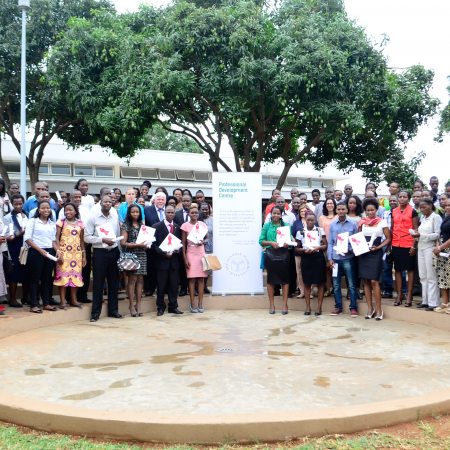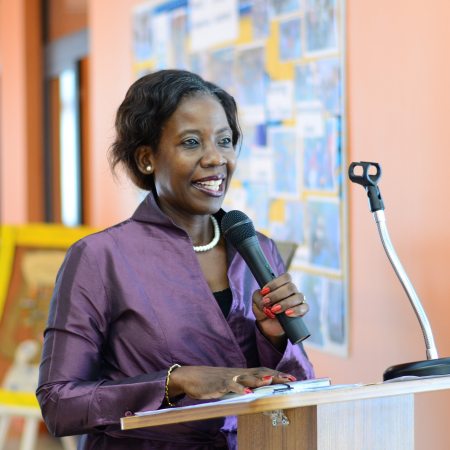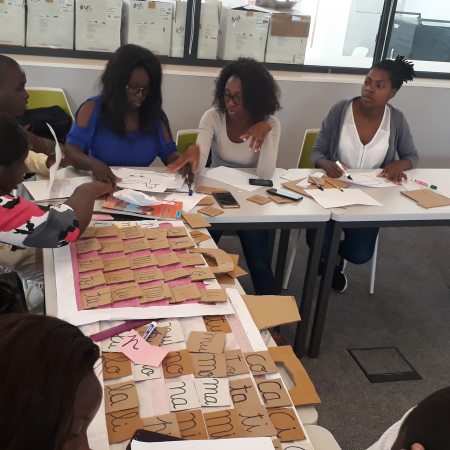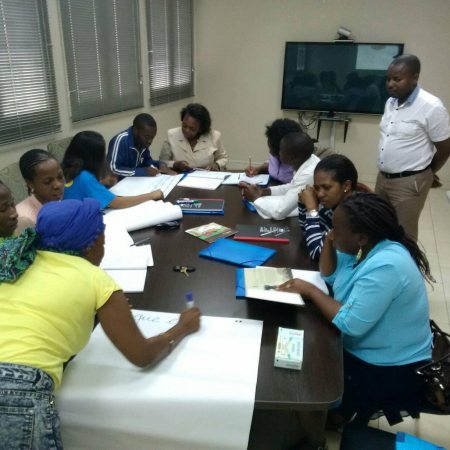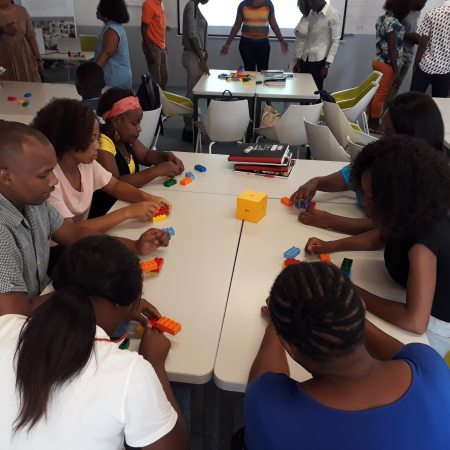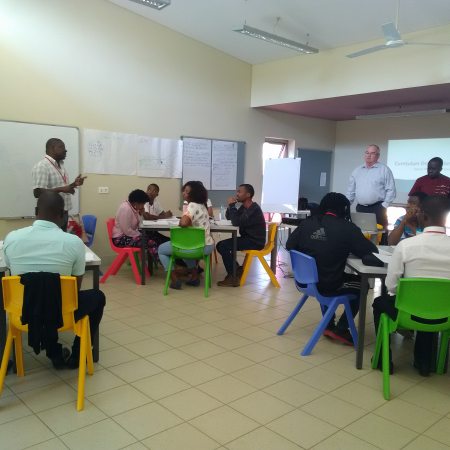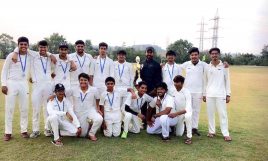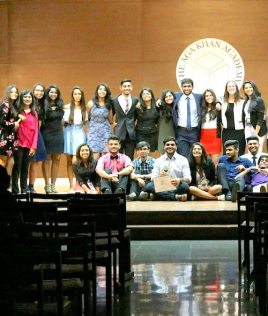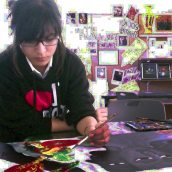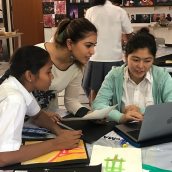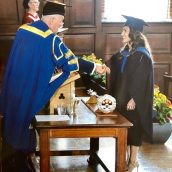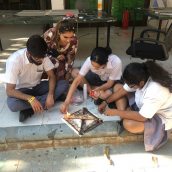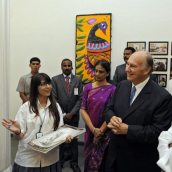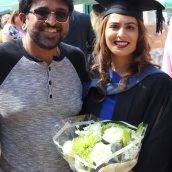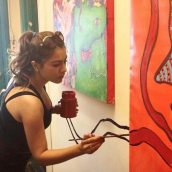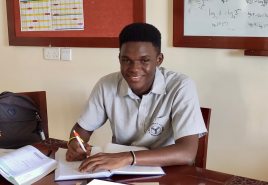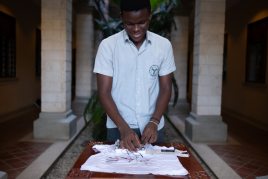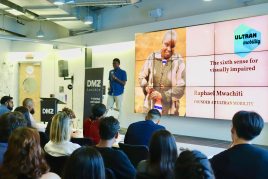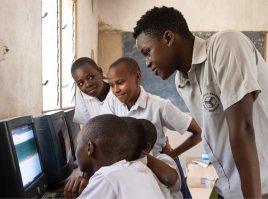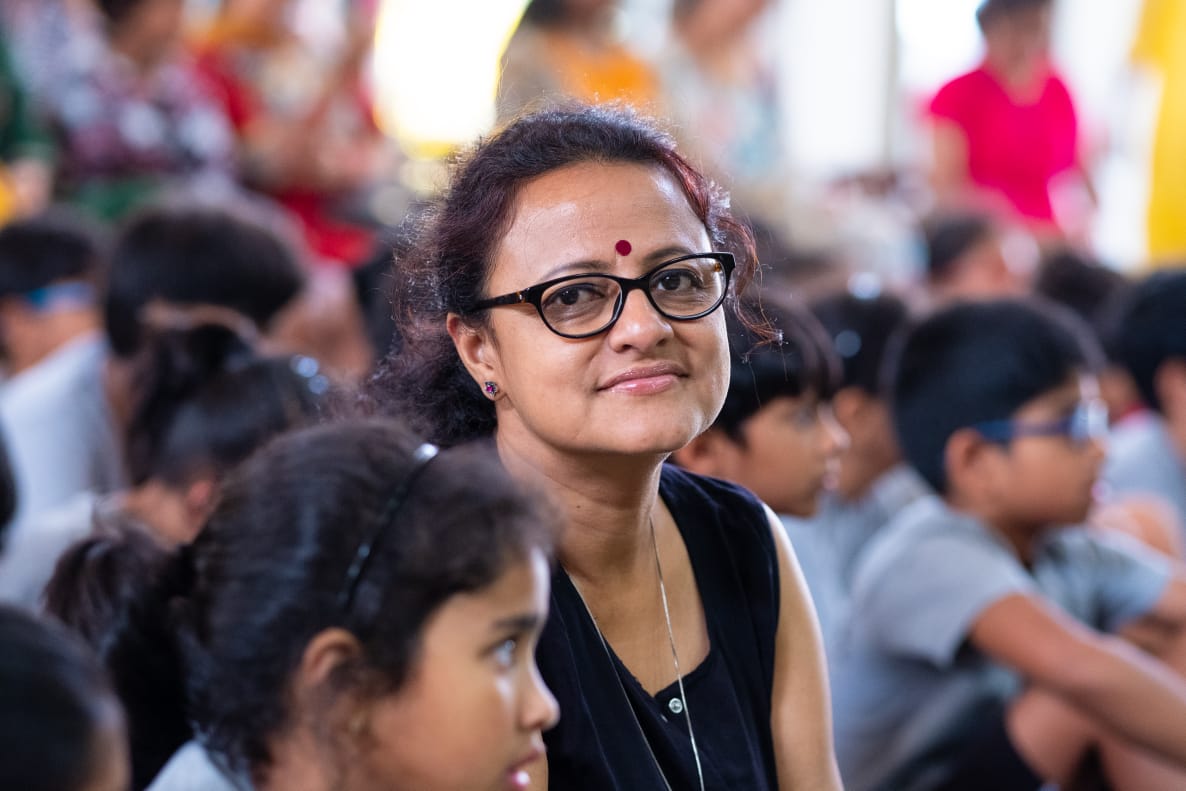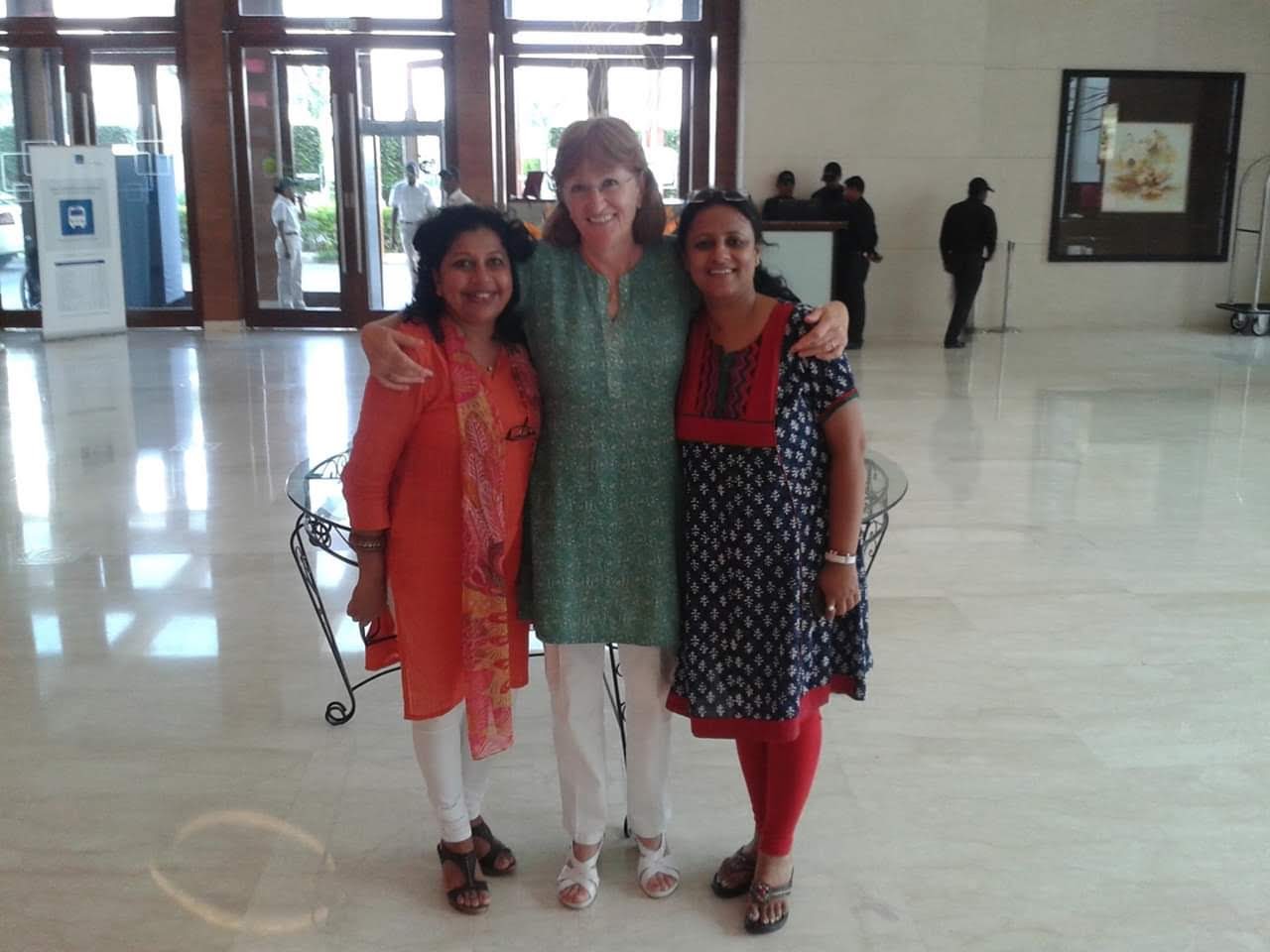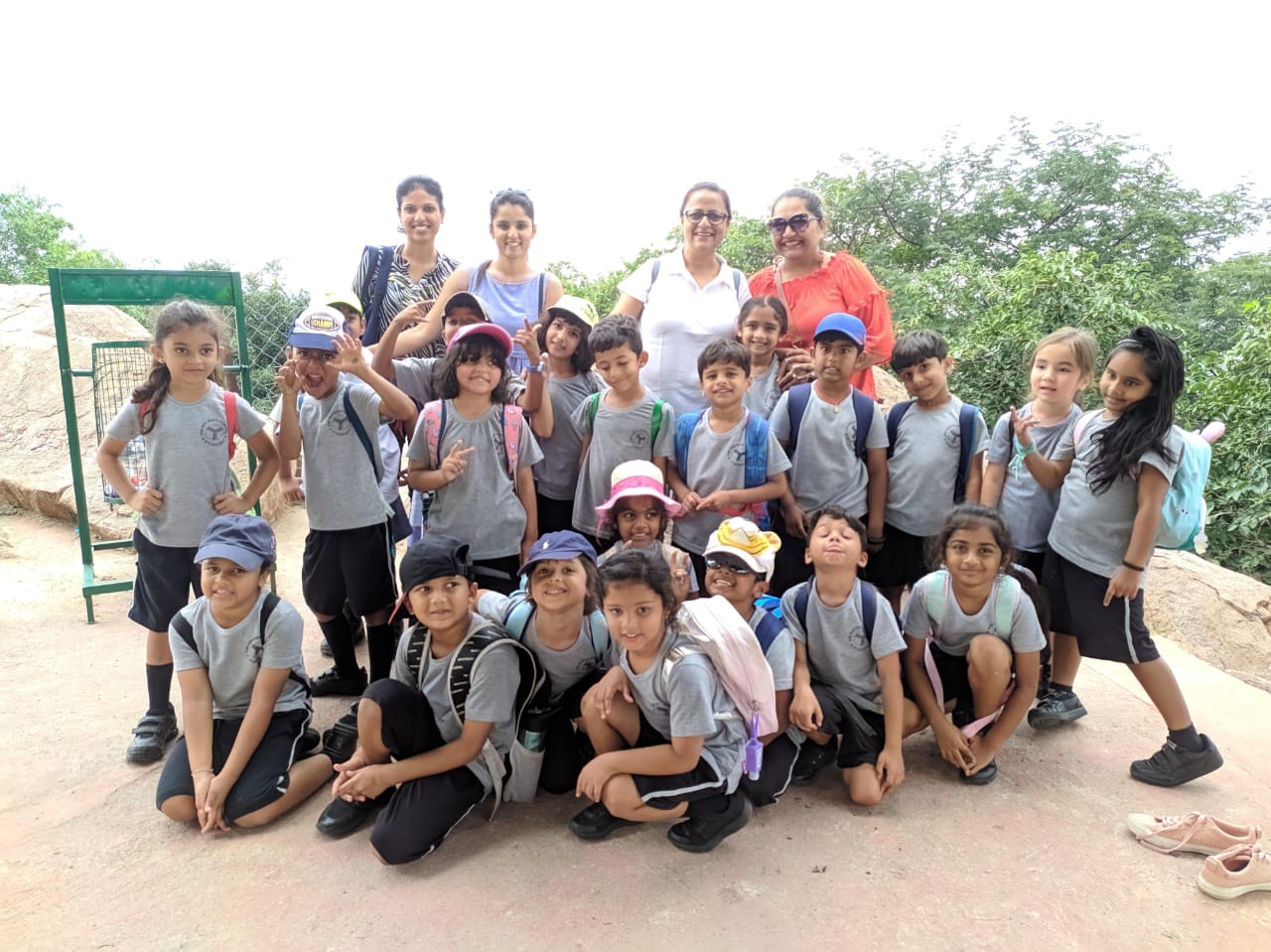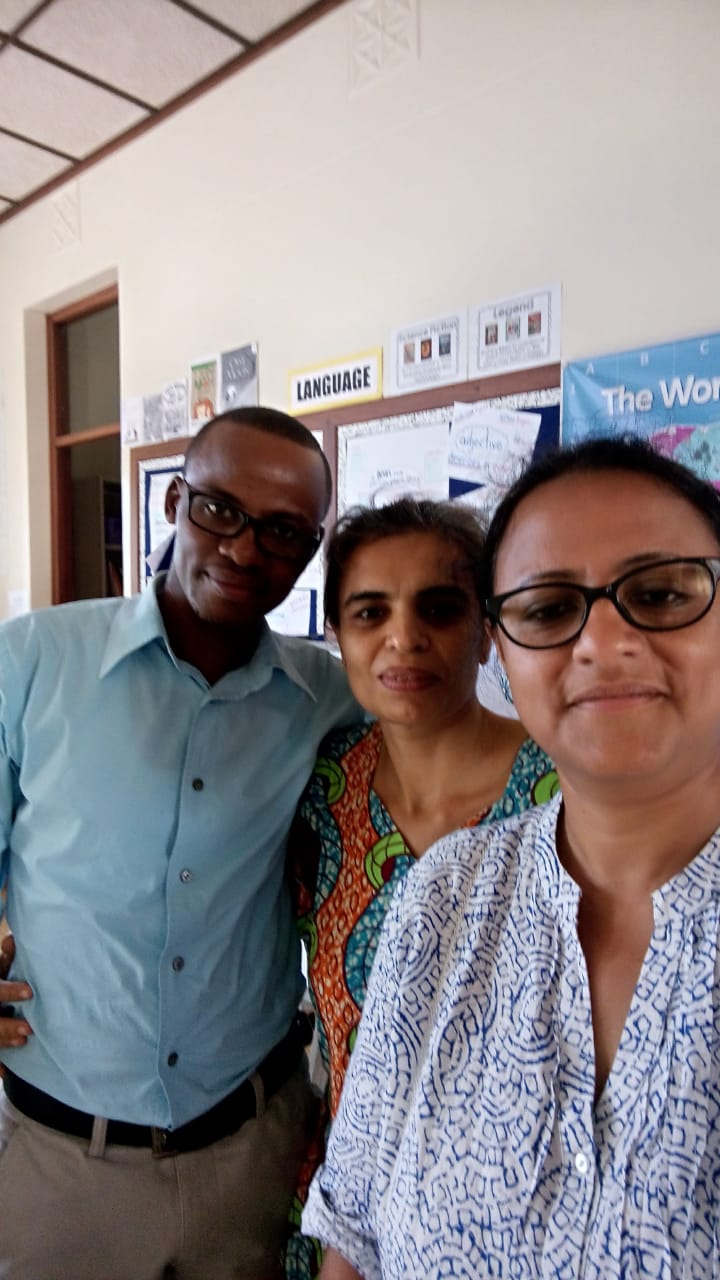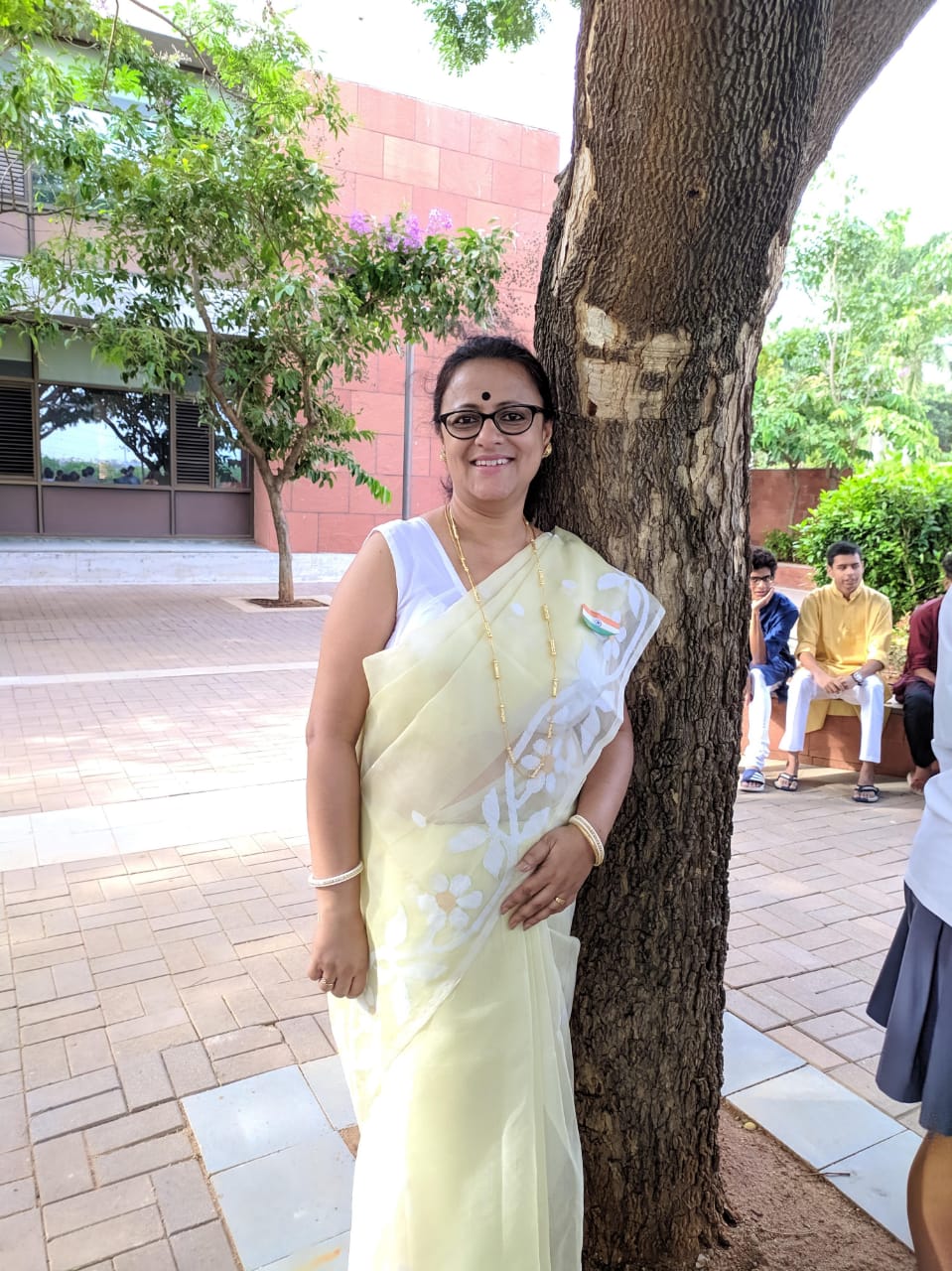AKA Maputo PDC celebrates 10 years
The Aga Khan Academy Maputo's Professional Development Centre (PDC) celebrated its 10-year anniversary this year. To commemorate this, we take a look back over the years at the work of the PDC.
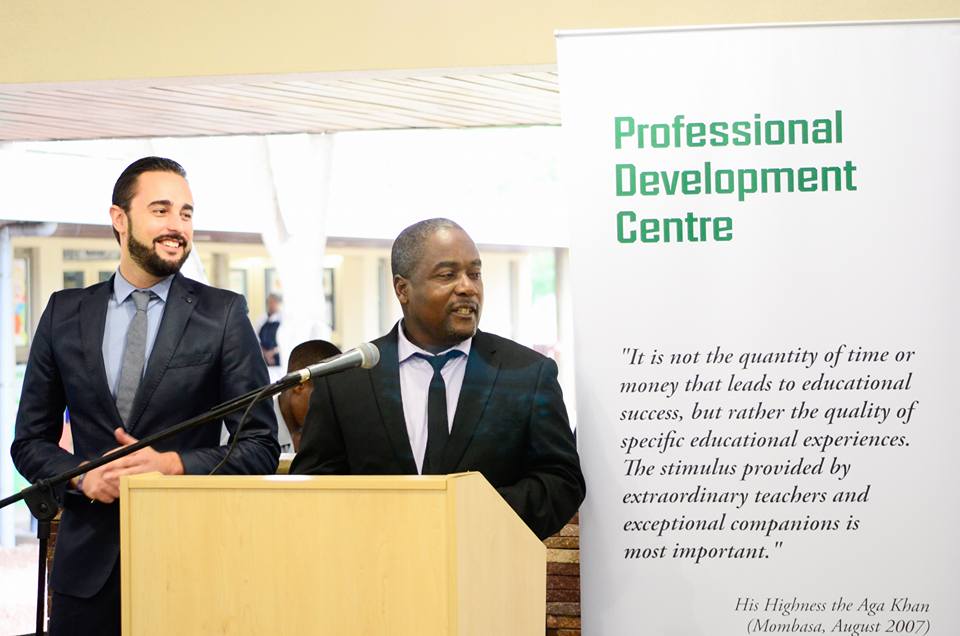
Kelvin Bagthariya: Generating positive change with resilience
Kelvin Bagthariya, a second-year Diploma student at the Aga Khan Academy Hyderabad, believes that his time at the Academy has taught him one thing in particular: resilience. Kelvin joined the Academy in year 9, and having come from a small town in Gujarat, it was a completely different environment. He believes the Academy has changed his mindset, teaching him to become independent, improving his self-esteem and allowing him to pursue his passion to make a change in his community.
“It was hard for me in the ninth grade as I grew up in a conservative society where people had closed mentalities and viewed life with confined perspectives – it was totally opposite when I came [to the Academy]. I was surrounded by people from diverse communities, with different perceptions and different approaches towards learning. Coming here to the Academy made me adapt to the pluralistic environment, helped me overcome new challenges and integrate [His Highness’s] vision towards my learning.”
For Kelvin, the attitude and assistance of the staff, teachers and his peers at the Academy were the reasons behind his resilience through this tough transition, especially in adjusting to a new way of learning and thinking. They were extremely encouraging towards Kelvin, which empowered him to take responsibility, get involved in enrichment activities and take on leadership roles.
“The journey has [inspired] many transformations in me since I joined. If I recall my first day [at the Academy], everything was new to me. I felt I wouldn’t be comfortable or accepted, and the first few months were lonely. But what the Academy has taught me is that you have to be independent. The Academy offers various opportunities from sports, service projects and various events. …Throughout my journey, being part of the school cricket team, participating and leading various service projects, being head of logistics in Model United Nations, summer internships, school trips and participating in cultural events has shaped me as an individual. It is very different from other schools. The journey wasn’t easy and couldn’t have been possible without my peers, teachers and assistance staff. After four years, if I look at myself, it is a proud moment for me.”
During his four years at the Academy, Kelvin has particularly enjoyed being part of the cricket team, Model United Nations, initiating the organic farming project at the Academy and doing a summer internship with the Aga Khan Foundation. Kelvin explains, “Enrichment activities give you a taste of real life and how it works.”
Through these enrichment activities and involvement in the community at the Academy, Kelvin was encouraged to contribute to the community in his hometown. “I am very passionate about bringing change in the society. When I see a problem, I want to make a change. I have the passion to be a leader and take responsibility. I always want to take initiative.”
Kelvin has taken initiative on an issue close to his heart and one of most pressing public health issues in his hometown: tobacco addiction. Kelvin lost a close friend to tobacco addiction, so he decided to partner with institutions in the Ismaili community such as the Aga Khan Education Board and the Aga Khan Youth and Sports Board to run a campaign to inform people about the consequences of addiction through a short movie that he scripted and acted in. He also created a youth group, worked with families struggling with addiction, visited schools and vulnerable areas, and organized health checkups. The project even received an award from the local government for its effort to mitigate tobacco addiction.
“I felt proud when 15-20 people came to me and said they are no longer addicted,” Kelvin shares.
Kelvin owes his enthusiasm to take initiative to the Academy, where he had always been motivated to do the same through his CAS and enrichment activities.
After graduating from the Academy, Kelvin wishes to pursue a degree in computer science in Canada. He hopes to use his education to work for the good of society, in particular for the Aga Khan Development Network and in the direction of His Highness the Aga Khan’s vision of improving the quality of life of people.
“His Highness says when you leave the Academy, you should be working for change in your own community. I have the responsibility as a global citizen to make a change””
By Inaara Gangji
Taniya Dharani - alumna returned as visual arts fellow
“The Academy has made me the person I am today,” she says. “I wanted to give back to the Academy what it has given me.” After graduating from the Diploma Programme, Taniya went on to pick up a Bachelor of Arts from the University of Reading, England. In her current role at the Academy, Taniya wants to help visual arts students prepare for university level art courses. It’s also on her agenda to introduce art students to careers in their field that they might not have considered.
“I want to help give our Diploma Programme art students theoretical practice that will be useful at university,” she says. “I also want to help visual art students understand what opportunities the art world outside holds for them; artistic pathways they can opt for including business and law options in sectors that not everyone is aware of.”
Though she has her task laid out in front of her, returning to the Academy in her new role is understandably strange for Taniya. “I still feel like a student at heart,” she says. “But I’ve learnt to act like a teacher and take responsibilities.” Taniya understands that her experience as a student at the Academy puts her in a unique place of understanding in her current role as teacher. “I feel privileged to have the opportunity to see Academy life from a different light this time. Now I understand the day to day challenges teachers face, as well as the hardships of student life.”
Taniya fondly remembers her time as a student at the Academy. When she graduated, Taniya was the only student in the visual arts department. “I really enjoyed visual arts in school. Being the only student, I had the entire art studio and Ms. Meenakshi to myself.” She is referring to Meenakshi Joshi, who is now MYP coordinator in the Senior School. She also remembers history classes with Koel Ray, and service opportunities at old age homes and government schools that taught her humility and empathy.
However, her most cherished memory at the Academy is meeting His Highness the Aga Khan. At the inauguration ceremony of the Academy in 2014, Taniya had the opportunity to show and discuss her art work with HH. “It was the most precious gift that I ever received and a memory that has helped me hold onto my passion.”
In her personal life, Taniya cites her father as her source of inspiration. It is a common trope that parents discourage their children from pursuing a career in the arts, but this wasn’t the case for Taniya. “Despite people not understanding my passion for painting, he [Taniya’s father] always stood by me and helped me achieve my goals,” she says. Taniya is also proud of her father’s efforts in community service and the life he has led. “His struggles and achievements inspire me. It makes me want to do great things.”
“Growing up I realised that the only thing that ignited a fire in me was holding a paintbrush in my hands and dropping paint all over my clothes. It made me feel like all is well in my world, even when almost everything in life was falling apart.” Taniya is in some ways a time capsule from the Academy’s early years, and like a time capsule, she reminds us of things that have changed, and also about the things that have remained the same.
Written by Ajay Sundaram
Raphael Mwachiti: Using technology to advance the community
When Raphael Mwachiti, a Diploma Programme (DP) student, got admitted to the Aga Khan Academy Mombasa on a fully funded scholarship through the Talent Identification Programme (TID) in 2015, he knew it was a life-changing opportunity.
“I was thrilled and filled with joy that I got to see my parents be proud of me for getting the admission but I also understood that it was now up to me to make use of the resources and support from the Academy to make something of myself,” Raphael says.
After five years at the Academy, he says his experience feels like a great adventure, one he had never thought of undertaking.
“I got to see different perspectives and meet people from different backgrounds,” Raphael says. “I’ve also been able to go to new places like Canada and Tanzania and learn many new things.”
Although he hit many bumps along the road, he says they’ve helped him grow as an individual and have given him a glimpse of the world to better prepare him to be an active member of his community.
Raphael has not only had outstanding achievements in the classroom but has applied what he’s learnt to effect change outside the classroom. He has embraced the ethos of the Academy by striving to improve the lives of others.
In 2019 he won the Ryerson Sandbox Basecamp prize for his innovation to aid the visually impaired. He was awarded a grant of $5,000 CAD and specialist professional advice to help advance his start-up. He is now working to produce these devices for further testing with the hope of impacting more than 250,000 visually impaired persons in Kenya.Additionally, Raphael helps farmers in his rural home of Kinango learn new farming techniques like greenhouse irrigation and composting, which are now being utilised to help increase harvest in all seasons thus increasing sustainability within the community. He also teaches computer skills to kids in his old school, which has evoked an interest in technology within them.
"I first met Raphael when we were doing the Talent Identification testing in October 2014,” says Dean of Admissions Paul Davis. “We sat outside one of the classrooms at St. Joseph's Primary School in Kinango. The first thing I remember asking him was whether he was emulating the great Italian artist. He mentioned that the name came from his dad, who was an artist and painted local wildlife and scenes to sell to the tourists in his shop in Ukunda."
"What I admired about Raphael at that time as well as his intellectual capacity was his honesty," said Paul. "He said that the most difficult moment he had to deal with was when he saw a child selling charcoal in Kinango and not going to school; he had reported it and the child was given free education. In a personal story he had written he mentioned a story about rescuing a child from a house on fire - when I asked about this and whether this had really happened, he admitted that it was not true and he had been told to write this by his teacher - he said he knew at the time that he should not be writing this and felt uncomfortable doing so. I had a feeling then that if we chose him he was going to be a self-driven and principled leader. I am pleased to see that these initial feelings were correct and he has turned into a fine ambassador for the Academy".
After being at the Academy for the last five years, Raphael now feels an even stronger responsibility to give back to his community and society at large. “With this understanding, I believe that the next wave of leaders coming from the Academy will be the foundation of positive change in the world,” says Raphael.
Watch Raphael's story, which is featured on the Aga Khan Development Network:
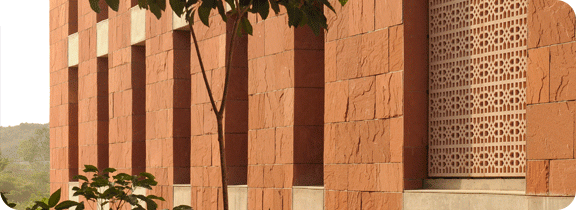
Quick Facts About the Academy
The Aga Khan Academy Hyderabad (established 2011)
Location: South of the city of Hyderabad, near the Rajiv Gandhi International Airport
Campus size: 100 acres of land allocated by the state government
Campus design and construction:
- total built area: approximately 500,000 square feet
- master facilities planners for the Academies: Sasaki Associates Inc. of Boston, USA
- campus design: award-winning architect Bimal Patel of HCP in Ahmedabad, India
- campus construction: Shahpoorji Pallonji
Curriculum
The Aga Khan Academy Hyderabad is an International Baccalaureate (IB) World School
IB programmes:
- Primary Years Programme: grades 1–5;
- Middle Years Programme: grades 6–10;
- Diploma Programme: grades 11–12
Aga Khan Curricular Strands, implemented across the curriculum:
Ethics, Pluralism, Cultures (with an emphasis on Muslim civlisations), Governance and Civil Society, and Economics for Development
Staff and students
Faculty numbers: 8 senior management, 63 Senior School faculty, 19 Junior School faculty, 7 working in both Senior & Junior Schools, 42 administrative staff
Number of students currently enrolled: 632 day and residential students in total: 140 day students in the Junior School; 492 students in the Senior School, with 245 in residence
Numbers of students and teachers at full capacity: 750 students and 90 teachers, with over 40% of students receiving some form of financial aid
First IB Diploma Programme graduating class: 2014
Residential students
Number of residential students: 245 currently, with full capacity of 300 students
Number of students per room: Between 2 and 4, with second year Diploma Programme students in single/double rooms
Residential facilities: Student lounge with multimedia and entertainment equipment, study areas, laundry facilities, dining hall
Campus facilities
Sports facilities: 25-metre swimming pool, diving pool, gym, two regulation-sized basketball courts, three cricket pitches with net practice facilities, two tennis courts, four squash courts, athletics track, junior play area, hockey field, training field, 2.5 km cross-country track
Arts facilities: Rooms for fine arts, music, dance; individual music practice booths; music recording area; amphitheatre performance space
Academic areas: Junior School classrooms, Senior School classrooms, science and computer laboratories, library and resource centre, arts facilities, music and dance studios
Residential buildings: 6 residential blocks: 3 male and 3 female; 6 dorm parent apartments in each block. Each block has a central atrium, lounge area, patio and laundry facilities.
Health and Wellness Centre: 12 beds and a full-time, qualified nurse
Professional Development Centre
The Aga Khan Academy Hyderabad is home to a Professional Development Centre for the advancement of teachers. The primary objective of this centre is to provide professional development that will benefit the wider school system in India.
Programming began in June 2010 with a Professional Learning for Educators Series for teachers in local government, independent and not-for profit schools.
The Aga Khan Academies network
18 Academies are planned in Africa, South and Central Asia, and the Middle East.
3 Academies are currently operating: Mombasa, Kenya (opened 2003); Hyderabad, India (opened 2011); and Maputo, Mozambique (opened 2013).
When complete, the network will represent 2,000 teachers and 14,000 students (boys and girls), with 1,400 graduates annually.
Institutional partnerships include:
Agencies of the Aga Khan Development Network; the International Baccalaureate, universities including the University of British Columbia, Concordia University, Ryerson University, University of California - Los Angeles, California State University - Northridge
Government partnerships include:
The Province of Ontario, Canada; the Ministry of Education, Science and Technology, Kenya; the Ministry of Education and Human Development, Mozambique; the French Development Agency (AFD); the French Mozambican Cultural Centre (CCFM - Centro Cultural Franco-Mozambicano); the Department of School Education, Telangana, India
Download the Quick Facts sheet here. ![]() AKA-Hyderabad-Quick-Facts.pdf
AKA-Hyderabad-Quick-Facts.pdf
Videos
The videos below provide more information about the Academies and glimpses into student life at the Aga Khan Academy Hyderabad.
Pages
Yamini Nibhanupudi (Class of 2014) - Looking at activism through a filmmaking lens
In an honest commentary on the creative process, filmmaker Stanley Kubrick said, “I do not always know what I want, but I do know what I don’t want.” The philosophy behind this method can be extrapolated to the lives of creatives, who wear many hats on their way to becoming who they are. Yamini Nibhanupudi graduated from the Academy in 2014 having focused on maths and sciences in the Diploma Programme. Since then she has roamed the highways of academia, always preferring the scenic route. She studied social sciences, stopped along the way to dabble in research and policy work, and ultimately discovered a passion for filmmaking. “For me,” she says, “deciding to stay in India and continue a life here is the best decision I made.”
Following her high school graduation, Yamini joined the Tata Institute of Social Science, Tuljapur, enrolling in their School of Rural Development. Here she studied political science, gender studies, history and sociology. During this time she worked with the Foundation for Democratic Reforms in Hyderabad, a think tank dealing with policy making. She also interned with Aga Khan Rural Support Program at Khandwa in Madhya Pradesh, working with farmers and marginalized communities. “I always wanted to work with people who spend every single day without any resources at their disposal, to work on the pressing issues that exist in India, issues that most of us never see through our rose tinted glasses.”
“I never lived under the illusion that I would be able to improve the lives of people in India,” she says, adding, “I would like to, but I honestly wouldn’t know where to start.” Writing her final paper as an undergrad, she realized how she could authentically contribute to society. Yamini wrote her dissertation on ‘Gender Roles in the Telugu Film Industry.’ As she delved deep into the paper, she recognized her long held passion for film. She was accepted by TISS Mumbai’s School of Media Studies the same year.
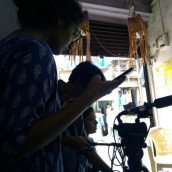 Her choice was validated almost immediately, getting to work at a production house in Mumbai at the end of her first year, and then winning a competition to get a one-minute silent film funded. “A Mute Point” was then screened at the 16mm Film Festival. “It’s been quite a ride since graduating in 2014,” she says looking back, “and I honestly wouldn’t have it any other way.” She is on track to graduate with a Master’s in Media & Cultural Studies in May 2019.
Her choice was validated almost immediately, getting to work at a production house in Mumbai at the end of her first year, and then winning a competition to get a one-minute silent film funded. “A Mute Point” was then screened at the 16mm Film Festival. “It’s been quite a ride since graduating in 2014,” she says looking back, “and I honestly wouldn’t have it any other way.” She is on track to graduate with a Master’s in Media & Cultural Studies in May 2019.
Yamini is a strong proponent of public and government universities. She believes that they are the gateway to a range of education opportunities available in India, and creates an avenue to meet people from across the nation. “I think most people who go to IB schools don’t see India as a viable option to study for their years in university,” she says. “Unfortunately, most of them never truly realise the kind of exposure that you can receive here.” She later adds, “A lot of people might argue that they would gain more exposure and a better understanding about the rest of the world by going abroad. But they have never stepped out of their city in India and a lot of them rarely have friends out of their social class or caste in the country. I've been lucky to learn from wonderful people about the work they've done or that they intend to do with their lives, and India in itself has such wonderful and diverse cultures that I would probably never have ever been exposed to had I studied elsewhere.”
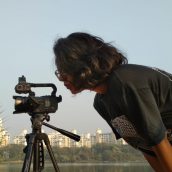 90% of graduates from the Aga Khan Academy Hyderabad have gone on to study abroad, and several students join the IB programme explicitly to have the opportunity to study in the West. Yamini says that an IB education is more than that, and that an education at the Academy was more significant to her than just a stepping stone. “IB teaches you to think critically, and to question everything,” she says. “In a country where rote learning is so persistent, it existed as a breath of fresh air for me.”
90% of graduates from the Aga Khan Academy Hyderabad have gone on to study abroad, and several students join the IB programme explicitly to have the opportunity to study in the West. Yamini says that an IB education is more than that, and that an education at the Academy was more significant to her than just a stepping stone. “IB teaches you to think critically, and to question everything,” she says. “In a country where rote learning is so persistent, it existed as a breath of fresh air for me.”
“The Academy prepared me for a lifelong affair with academia,” she confesses. “I learned to love research to the extent that I have considered going into teaching and pursuing a PhD.” Yamini is quick to add that her experiences at the Academy go beyond just education. “Being part of a community like this, which continues to check up on its alumni, and which still continues to be there for us years after we have graduated, is an immense source of pride.”
Students and professors at TISS take social activism to be an integral part of being an educated member of society and are involved in forcing change on their campuses, their cities and their fields. “I've learnt my place in this country from both a social and political standpoint,” says Yamini. “If I look back at 2018, I can see the fight that so many people have been a part of, whether it is about caste issues, the landmark judgement scrapping section 377, to the horrific [Transgender Persons] bill of 2018 that was passed, marginalising the very community it was meant to protect. I see my peers around me fighting every day and I can do nothing but support and document them.” Using her passion for filmmaking, Yamini hopes to make a responsible, self-aware contribution to these movements. “I would like to be able to tell their stories with them, with their permission, and with their direction. I know for a fact that I can’t, and in fact shouldn’t be their voice, but I can do everything in my power to back their voices.”
 Yamini’s education has been broad and diverse, incorporating the complexity of sciences, the gentility of humanities and the adroitness of cinema. But unlike the Kubrik-ian creative littering the highway with discards, she uses detours to inform her work and her personality. “I never really had any clarity about what I wanted to do,” she says, "but now that I do, I’m pushing towards it with all the energy in me.”
Yamini’s education has been broad and diverse, incorporating the complexity of sciences, the gentility of humanities and the adroitness of cinema. But unlike the Kubrik-ian creative littering the highway with discards, she uses detours to inform her work and her personality. “I never really had any clarity about what I wanted to do,” she says, "but now that I do, I’m pushing towards it with all the energy in me.”
Written by Ajay Sundaram
Laboni Banerjee: cultivating community wherever she goes
Laboni was immediately attracted to AKA Hyderabad because of the vision and mission of His Highness the Aga Khan for the Aga Khan Academies. She found the values of the Academy to be more aligned with her own ethos than the school she was previously working at before joining the Academy.
“Over the course of 10 years at the Academy, I have found myself a part of a vibrant and caring community,” Laboni said.
When joining the Academy in 2010, Laboni recalls it being a much smaller school then, especially the International Baccalaureate (IB) Primary Years Programme (PYP). There were only seven PYP teachers and the Junior School principal at the time, Diana Smith who started the PYP at the Academy, along with Sreelatha Kumar, who was the PYP coordinator at the time and is now the Junior School principal. AKA Hyderabad received the Diploma Programme and Middle Years Programme authorisation in 2012 and 2013, respectively. The latter year is when Laboni remembers seeing notable growth in both students and faculty at the Academy.“Early years in the PYP were busy,” Laboni said. “During this time, I was also focusing on identifying myself as a member of the PYP team and growing with the school.
Over the course of her time at AKA Hyderabad, Laboni has taken on various roles. Along with being a Grade 3 teacher, Laboni took a role in the PYP reading and writing assessment in which she collected evidence and data. Laboni also helped with the Admissions Department and was responsible for checking the vocabulary of students applying to the Academy. Reflecting back, Laboni said she greatly appreciated this role because it allowed her to build a special relationship with parents and students from the very beginning of their Academy journey.
“While working with the Admissions Department I valued meeting a large number of people who were enthusiastic and eager to learn more about the PYP in the early years.”
From 2012–2014 Laboni helped with AKA Hyderabad’s Outreach Teacher Training programme, which is a core part of Academies’ Professional Development Centre (PDC) that trains local teachers around the community in various subject areas and enhances their pedagogical skills.
A few years ago, Laboni also had the opportunity to travel to the Aga Khan Academy in Mombasa, Kenya where she truly began to appreciate the pluralistic approach to education and diverse cultures and backgrounds the Academies values and emphasises. During her time in Mombasa, Laboni met Titus Mutemi, who was a recent graduate of the Teacher Preparation Programme – a programme provided by the Academies that trains teachers to become IB educators in their communities – and is now the PYP coordinator at AKA Mombasa. Laboni recalls Titus being filled with great enthusiasm and eagerness as he wanted to know everything about her class including the assessment techniques, books she has students read, any material created for the class and much more.
“Partnering with Laboni was such an enriching experience,” Titus said. “Her flexibility and open-mindedness made our collaboration easier and enjoyable. Years have gone by and yet her enthusiasm and unique way of engaging with the young learners is still memorable.”When AKA Hyderabad transitioned to online learning in March 2020 due to COVID-19, Laboni said there were a few challenges she faced but was able to overcome due to the support she received from the Academy.
“In the PYP we have always used technology as a learning and teaching tool. However, when we shifted to complete online teaching, building the bridge with new students I had never met before was the biggest challenge. With physical teaching, I was able to bond with my students on a personal level, but this changed with distance learning.
However, the Academy always supported me and made me feel comfortable working on a virtual platform with a new group of learners. Assigning me to be a part of various online professional development sessions was immense support as it helped me develop my understanding of the application of various teaching tools. The virtual learning and teaching also enabled me to look at my own teaching philosophy through a different lens and reimagine my teaching strategies. Now, it is my greatest joy and top priority to see my students online and have personal conversations with them.”Laboni said she cannot imagine her future without the Academy being a part of it. She is always involving herself in different roles throughout the Academy in order to connect with more students beyond the PYP and see how they turn their passions into reality. Laboni also said she is fortunate to be a part of a community that is continuously supportive and where she is encouraged to grow each day as an educator and individual.
“The greatest part about delivering education at the Academy and being a part of its community is that every day is a learning experience for me. I am always excited to see my students become open-minded young adults, chasing their greatest passions in life and thinking about how to make the world a better place for all.”
